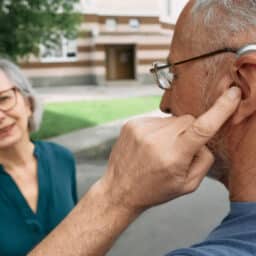Tips to Improve Communication This Valentine’s Day

February 14th is Valentine’s Day, which happens to fall in American Heart Month, giving you two excellent reasons to celebrate your relationship. Whether you and your partner have been together for 30 days or 30 years, take some time this month to think about the role communication plays in the happiness of your relationship, and…
How Improved Hearing Makes Busy Gatherings More Fun

The holidays are coming to a close, but that doesn’t mean the busy gatherings are over. If you’re living with untreated hearing loss, you might be exhausted from a month of festive events. Part of that exhaustion stems from the constant effort required to decode speech when hearing loss muffles it. Luckily, hearing aids can…
Rediscovering Your Hobbies With Clear Hearing

We all have our favorite hobbies. Some people like to paint, others play Pickleball at Planet Pickle in Suwanee. Whatever hobby you enjoy, it’s crucial not to let hearing loss get in the way. How Can Hearing Loss Disrupt My Hobbies? There are three main ways hearing loss may disrupt your hobbies: While untreated hearing…
How Can Hearing Aids Help Strengthen My Family Relationships?

Family relationships can be complicated, but they often play a meaningful role in our sense of connection and belonging. One of the most important things for strong family relationships is communication. When hearing loss disrupts communication, we can see the effects ripple through the home. Let’s examine how poor communication impacts family life and how…
The Emotional Benefits of Better Hearing in Your Daily Life

The impact of hearing loss isn’t always immediately visible. When your hearing loss is mild, you might find yourself getting occasionally frustrated because people sound like they’re mumbling. As hearing loss progresses, feelings of isolation or sadness can accompany the frustration. While they’re not a direct mental health treatment, the clearer sound hearing aids offer…
How To Identify Subtle Hearing Changes Before They Escalate

We often call hearing loss an invisible condition. In this case, the word invisible doesn’t just mean there’s a lack of visible symptoms. It also refers to the tendency for people to ignore the condition. Only about 20% of people with inner ear hearing loss seek treatment, and many individuals wait ten years or more…
Hearing Aids for Medical Professionals: Finding the Best Fit for Your Job

Hospitals like Emory and Northside are fast-paced, high-stakes environments where effective communication is key. Whether you’re a nurse making rounds, a physician in surgery or a technician monitoring patient equipment, your ability to communicate clearly is essential to providing safe, effective care. An estimated 10% of all healthcare and social assistance (HAS) workers have difficulty…
Overcoming Three Common Worries About Hearing Aids

Nearly 20% of the global population has hearing loss. Despite how widespread the condition is, many avoid seeking treatment for it. Let’s take a look at three common worries people have about committing to hearing aids, and how you can conquer them to enjoy clearer hearing. Worry #1: Hearing Aids Won’t Help Me Many people…
Understanding Hearing Health for Hunters

Many Georgia hunters look forward to crisp mornings in the Etowah Valley Game Preserve during deer, turkey and rabbit seasons. While hunters pay close attention to firearm safety, camouflage and outdoor conditions, one detail is often overlooked: protecting your hearing from gunfire. Firearm Noise Levels in the Field The sharp crack of a shotgun, rifle…
Understanding Water Resistance in Hearing Aids: Summer Safety Tips

Long days, warm sunshine and afternoons at the pool make summer a favorite season for many. But if you wear hearing aids, you may wonder how safe your devices are around water. Whether you’re lounging by the Washington Park Natatorium pool or caught in a sudden rain shower, understanding water resistance can help protect your…


